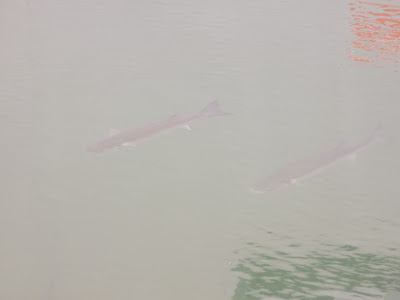Perhaps the easiest bird to see at the reserve, and indeed anywhere along the UK's coast, is the black-headed gull.
It's estimated that around two thirds of UK black-headed gulls in winter are actually migrants from mainland Europe. In winter these birds lose the chocolate-brown plumage which give them their name and just a brown smudge remains.
There were plenty of ducks on the reserve although most were females which look very similar and are difficult to identify from a distance on a murky day.
I suspect all or at least most of these ducks are wigeon- the bird in the top left is clearly a male wigeon. Wigeon do breed in the UK but only in Scotland and Northern England so these birds will be winter migrants from Iceland, Scandinavia or Russia.
Wigeons are dabbling ducks, like mallard, which means they feed by tipping headfirst into the water. The legs of dabbling ducks are more central than other types which means they can walk well on land and graze there.Diving ducks have to run across the water in order to gain momentum to take off whereas dabbling ducks are able to take flight straight from the water.
As you'd expect at this time of year there were plenty of waders around in the shallower water. I still find wader identification really tricky especially in winter when they tend to be similar light grey colours- it's highly possible some of my identifications are not right.
There were many small waders which I think are probably dunlin- they are after all our most common small wader.
Unlike other small waders, dunlin have slightly curved beaks which seems to be the main way to identify them.
The largest waders of the day were the black-tailed godwits on the left of this photo.
It's interesting to see that these godwits still look fairly bright, not yet having faded to their full greyer winter plumage. I'm speculating that unlike other waders I saw, these are actually resident birds (I've certainly seen godwits at the reserve all year round) and therefore don't naturally fade as early.
One more wader I saw was the greenshank.
Greenshank aren't especially common in the UK with a few breeding in Northern Scotland and then a few overwintering here on the South coast. Like most waders they mostly eat small invertebrates but will catch small fish and amphibians.
I also spotted several oystercatchers.
It would be easy to assume that these birds eat oysters but unfortunately their name isn't really very accurate. They mainly eat cockles and mussels but also eat worms, especially if they are inland. Indeed, over the last fifty years more birds have started to breed away from the coast.
It wasn't just aquatic birds I spotted on the reserve. You wouldn't necessarily expect to see goldfinches on a freshwater marsh but there they were amongst this red plant.
Also taking advantage of this habitat were a few meadow pipits like the slightly blurry one I captured here.
These birds are found all over the UK but mostly stay in the uplands in the breeding season. However, in winter they move South to the lowlands and becomes much commoner in the Southern half of the UK.
I was surprised on my way back to the town through the yacht marina that there were a lot of larger fish right near the shore.
I wonder why these fish were on the land side of the yacht marina. No fishing is allowed in the marina so they are protected by that and the large amount of human activity and the shallow water means they are protected from most predators.
I suspect, though I'm not sure, that these are thick-lipped mullet. There are four species of mullet in the UK- red mullet, which these look too dark to be, the golden grey mullet which isn't usually found at estuaries and harbours and the thick-lipped grey and thin-lipped grey mullet. These fish are often found in shallow waters and can even enter freshwater.
That's all for now, see you again soon!













No comments:
Post a Comment